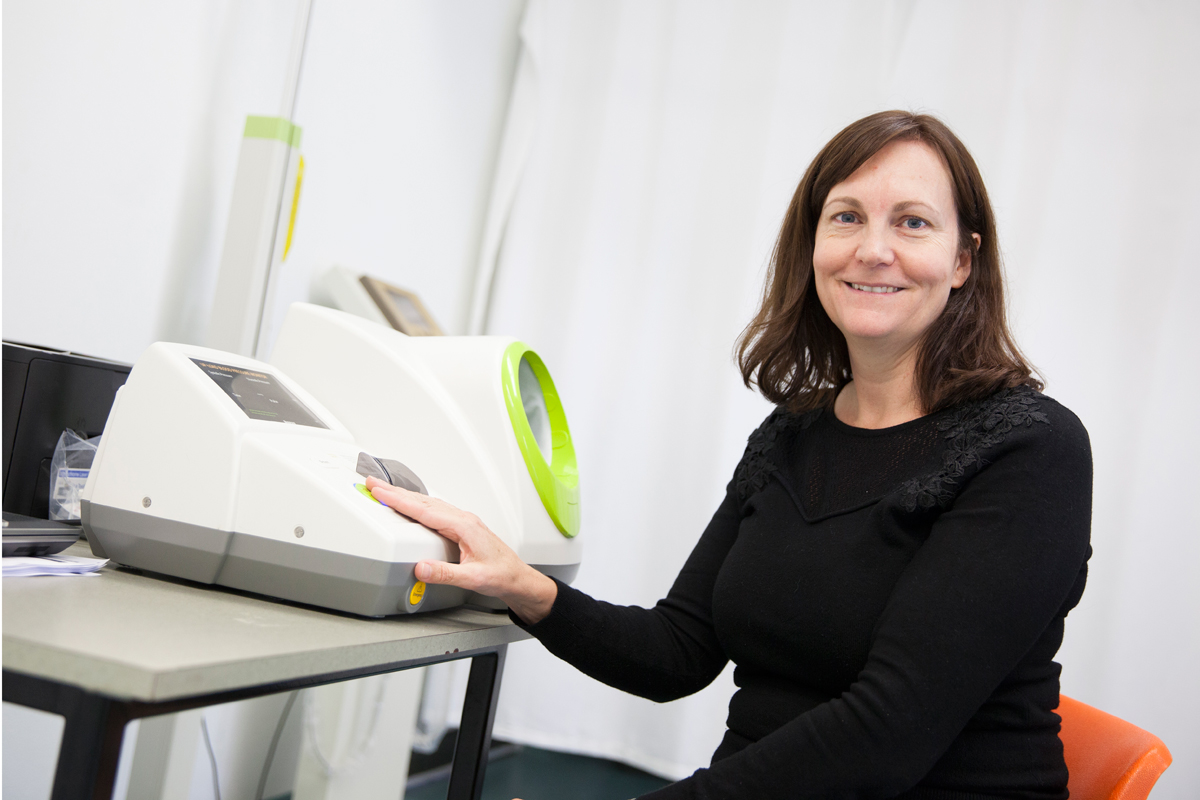Researcher Highlights
The Composition of Rural Health
Academic lead Leanne Brown
Dietitian Dr Leanne Brown is working towards improving the health of rural Australians, as well as the sustainability of the clinical workforce who look after them.

Leanne is a Senior Lecturer and Academic Lead, Teaching and Learning at the University of Newcastle, Department of Rural Health (UONDRH).
An Advanced Accredited Practising Dietitian with more than 20 years experience in the dietetics profession, Leanne spent ten years in metropolitan hospitals before joining the UONDRH in Tamworth in 2003.
With support from the Commonwealth Government, the UONDRH works toward a sustainable rural health workforce through facilitating student placements and learning, enhancing the health of local communities through community projects and conducting research into rural health issues.
Leanne completed her PhD (Nutrition and Dietetics) at the University of Newcastle 2009, with her doctoral research investigating the barriers to the provision of a best practice dietetics service in rural areas.
Her ongoing research interests include dietetic workforce issues, rural dietetic services, sports nutrition, and best practice dietetic services for rural areas.
Nutrition and diet
Leanne’s work is readily translational to public health programs that can change health outcomes, especially in a rural context.
And it seems those programs are more necessary now than ever.
Leanne admits to being concerned when recent data from the Australian Health Policy Collaboration found the local area to have some of the highest rates of overweight and obesity in Australia.
“We have a focus at the moment on a research project looking at cardiovascular disease rurally, and trying to look at different ways of engaging with people,” Leanne says.
“Obviously the further you go out from major cities, the more difficult and expensive access to fresh food becomes.”
“If you don’t have a lot of income or accessible transport, and you live in a part of town that is only serviced by corner shops and takeaways, your food choices are very limited.”
One area of possible change that Leanne is a strong advocate for is implementing lifestyle change instead to combat health risks related to ill-health such as cardiovascular disease, obesity, and diabetes.
“We are trying to intervene earlier and support people to try some dietary changes, and use phone and text to follow people up as opposed to having to wait for appointments.”
Rural focus on learning
As Academic Lead, Teaching and Learning at UONDRH, Leanne supports students on placements navigate practice based education, learning and assessment.
An area of current focus at the UONDRH is inter-professional education, with the aim of improving relationships in healthcare practice.
“We have year-long student placements in medicine and some allied health disciplines,” Leanne explains.
“So we are getting those students together on a monthly basis and engaging them in an inter-professional activity with them that is focused on a health topic or communication skill that is relevant across disciplines.”
“Our role is also to provide continuing professional development locally, so we organise speakers and information days on relevant topics for students and clinicians.”
“We have also just started a local graduate network that offers new practitioners professional and social support to work rurally.”
Body Composition
Leanne has accreditation as a Level 3 Anthropometrist with the International Society for Advancement of Kinanthropometry. She explains:
“We can measure height and weight and calculate BMI but we know that BMI is not the best indicator of whether you are overweight or not,” she says.
To get a more accurate measure of body composition Leanne uses bioelectrical impedance analysis, which differentiates between muscle and fat.
“So not only is this differentiation important when predicting health outcomes, but it is a way to evaluate the success of exercise and diet interventions despite overall weight not changing significantly.”
Sports nutrition is another area of expertise for Leanne.
Whereas in the general population, the public health focus is most often on limiting energy intake to maintain or lose weight, the opposite can be true for elite athletes who need adequate energy to fuel significant exercise.
This area of specialisation also extends to knowledge of which sportspeople may benefit from which supplements that have an ergogenic effect, improving performance.
Future direction
Looking to the future, Leanne will continue several ongoing collaborations and her own research.
Leanne works with Associate Professor Kym Rae on the Gomeroi gaaynggal program, targeting the health of local rural Aboriginal mothers and their babies.
Another collaboration is with Dr Lesley MacDonald-Wicks and Dr Amanda Patterson, who are finalising for publication work on changing body composition and circumference measures of average urban and rural Australian women.
Leanne is also working in concert with Professor Clare Collins to replicate urban nutrition studies in the rural landscape.
Leading on from Professor Collins’ work using a spectrophotometer, Leanne is looking at comparing self-reported diet to actual diet reflected by the effects of carotenoid intakes from vegetables and fruit on skin colour.
Leanne is also looking to further develop a strong dietetics and nutrition focus at the UONDRH with fellow dietitian, Dr Tracy Schumacher.
Her wish list also includes more PhD students in dietetics choosing to study in Tamworth.
“Given the nutrition-related health issues in rural areas, we will be looking to implement and evaluate community based interventions so there are opportunities for students to be involved in positive change in rural communities.”
The University of Newcastle acknowledges the traditional custodians of the lands within our footprint areas: Awabakal, Darkinjung, Biripai, Worimi, Wonnarua, and Eora Nations. We also pay respect to the wisdom of our Elders past and present.
